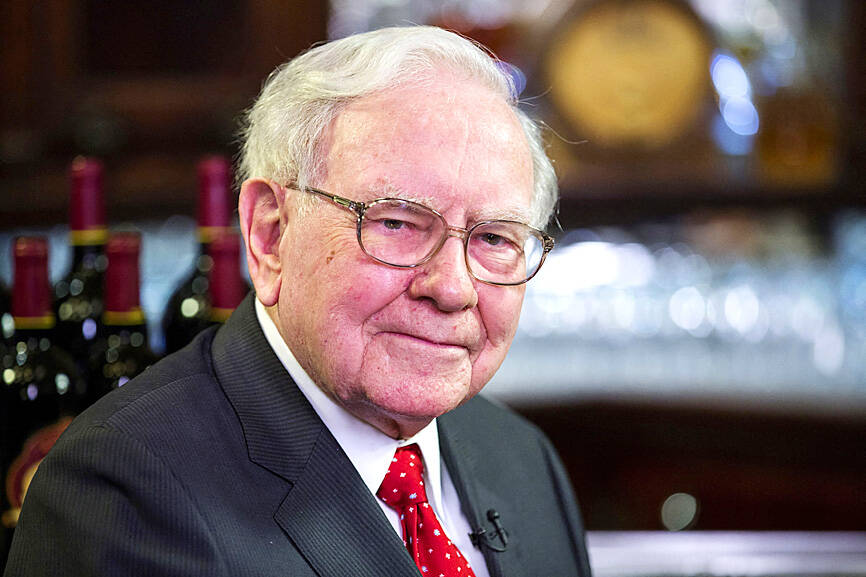Berkshire Hathaway Inc yesterday sold ¥164.4 billion (US$1.2 billion) of bonds, paying some of its highest costs ever to sell debt in the currency as speculation about Bank of Japan (BOJ) policy tightening increases the burden for issuers.
Warren Buffett’s firm, one of the largest overseas issuers of yen debt, paid higher spreads across all five tenors compared with a previous deal in December last year, while all-in costs for the transaction reflected an even steeper jump in borrowing.
The firm’s five-year note priced to yield 1.135 percent, according to an e-mail from Mizuho Securities Co, one of the joint book-runners on deal. That is nearly seven times higher than when the Omaha, Nebraska-based company paid when it debuted in the yen bond market in 2019, underscoring that Japan has not been immune to the global rise in borrowing costs.

Photo: Reuters
The deal came just days after the billionaire investor made headlines by saying he had increased holdings in Japanese trading houses.
Berkshire lured yen bond investors with stronger credit ratings from Moody’s Investors Service and S&P Global Ratings than the credit assessors give to the Japanese sovereign.
However, Japanese borrowing costs still remain low by global standards, but traders are betting that the central bank will follow global peers and exit negative rates under Bank of Japan Governor Kazuo Ueda.
“There is a strong possibility that the yen will appreciate, as the BOJ has nowhere to go but up while disinflation elsewhere means global rates have peaked,” said Amir Anvarzadeh, a strategist at Asymmetric Advisors in Singapore. “Japanese stocks are cheap and Buffett made a ton of money on those trades he bought in 2020.”
The proceeds from the offering will be used for general corporate purposes, including refinancing some debt, the issuer said in a filing earlier this month.
Buffett’s conglomerate has sold about ¥1.2 trillion of debt, including today’s offering, since its debut sale in 2019.
The US company, which Buffett took control of in 1965, surprised Japanese markets in 2020 when it bought shares in local trading companies after pricing one of the largest-ever yen bond deals by an overseas issuer.
Shares of Japan’s major trading houses jumped on Tuesday after Buffett told the Nikkei newspaper that Berkshire had raised holdings in them to 7.4 percent from about 5 percent in 2020.

IN THE AIR: While most companies said they were committed to North American operations, some added that production and costs would depend on the outcome of a US trade probe Leading local contract electronics makers Wistron Corp (緯創), Quanta Computer Inc (廣達), Inventec Corp (英業達) and Compal Electronics Inc (仁寶) are to maintain their North American expansion plans, despite Washington’s 20 percent tariff on Taiwanese goods. Wistron said it has long maintained a presence in the US, while distributing production across Taiwan, North America, Southeast Asia and Europe. The company is in talks with customers to align capacity with their site preferences, a company official told the Taipei Times by telephone on Friday. The company is still in talks with clients over who would bear the tariff costs, with the outcome pending further

A proposed 100 percent tariff on chip imports announced by US President Donald Trump could shift more of Taiwan’s semiconductor production overseas, a Taiwan Institute of Economic Research (TIER) researcher said yesterday. Trump’s tariff policy will accelerate the global semiconductor industry’s pace to establish roots in the US, leading to higher supply chain costs and ultimately raising prices of consumer electronics and creating uncertainty for future market demand, Arisa Liu (劉佩真) at the institute’s Taiwan Industry Economics Database said in a telephone interview. Trump’s move signals his intention to "restore the glory of the US semiconductor industry," Liu noted, saying that

NEGOTIATIONS: Semiconductors play an outsized role in Taiwan’s industrial and economic development and are a major driver of the Taiwan-US trade imbalance With US President Donald Trump threatening to impose tariffs on semiconductors, Taiwan is expected to face a significant challenge, as information and communications technology (ICT) products account for more than 70 percent of its exports to the US, Chung-Hua Institution for Economic Research (CIER, 中華經濟研究院) president Lien Hsien-ming (連賢明) said on Friday. Compared with other countries, semiconductors play a disproportionately large role in Taiwan’s industrial and economic development, Lien said. As the sixth-largest contributor to the US trade deficit, Taiwan recorded a US$73.9 billion trade surplus with the US last year — up from US$47.8 billion in 2023 — driven by strong

STILL UNCLEAR: Several aspects of the policy still need to be clarified, such as whether the exemptions would expand to related products, PwC Taiwan warned The TAIEX surged yesterday, led by gains in Taiwan Semiconductor Manufacturing Co (TSMC, 台積電), after US President Donald Trump announced a sweeping 100 percent tariff on imported semiconductors — while exempting companies operating or building plants in the US, which includes TSMC. The benchmark index jumped 556.41 points, or 2.37 percent, to close at 24,003.77, breaching the 24,000-point level and hitting its highest close this year, Taiwan Stock Exchange (TWSE) data showed. TSMC rose NT$55, or 4.89 percent, to close at a record NT$1,180, as the company is already investing heavily in a multibillion-dollar plant in Arizona that led investors to assume